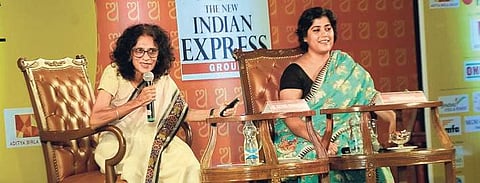

BHUBANESWAR: Many physicians over the centuries have earned more fame for their writings than with their scalpel. Take Anton Chekov, Sir Arthur Conan Doyle, Oliver Wendell Holmes and Robin Cook for example.
Or the likes of Khaled Hosseini, Siddhartha Mukherjee, Atul Gawande and of course Kalpish Ratna. The list of doctors writing for passion and earning recognition is quite an impressive and long one. But why are we talking physician writers?
Kalpana Swaminathan and Ishrat Syed, doctor duo which writes under the pseudonym Kalpish Ratna, have authored fiction that spans a unique range of history, medical information, science and speculation, all tied in through genre-defying storytelling.
Kalpana who captured audience attention on the concluding day of Odisha Literary Festival, spoke about ‘Synapse to murder: Transforming fact into fiction’ at the session chaired by author Deepanjana Pal.
The stories in their novel revolve around thought, memory and the field of neurology. The writers start with a fact, research it and give it a medical connect, binding humanities and medical science together, which gives their books a new dimension, she said.
With the subject itself requiring some understanding for school students, who were also a part of the session, the physician-author said synapse in medical terms is a junction between two nerve cells, consisting of a minute gap across which impulses pass by diffusion of a neurotransmitter.
Beginning her session by elaborating through various picture stories, she said, synapse, as in the novel, explores the time travel of memory on the edge of cataclysms. Drawing a comparison she says “we live in a space which is constantly changing and we change too.”
From the barbaric act of terrorist at Leopold Cafe in Mumbai to the Rudyard Kipling House where bust of Kipling has been receiving floral tributes and incense for more than 30 years by a man who never actually knew who the legendary man was, Kalpana said we all live in a space where the mind takes time to generate information after a shocking unexpected event.
The session concluded with the author leaving the audience in a virtual synapse, wanting to read her novel.